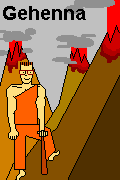
Let Your spirit lead me upon level ground.
-- Psalm 143: 10
The only thing you can count on in life -- ain't nobody won't hurt you if it'll help them.
-- Vin Diesel, "Knockaround Guys"
I'm a gentleman of style and taste.
-- Mick Jagger, "Sympathy for the Devil"
Successful and fortunate crime is called virtue.
-- Seneca
My father made him an offer he couldn't refuse... Luca Brasi held a gun to his head, and my father assured him that either his brains, or his signature would be on the contract.
-- Michael Corleone
Men are not in hell because God is angry with them. They are in wrath and darkness because they have done to the light, which infinitely flows forth from God, as that man does to the light of the sun who puts out his own eyes.
-- William Law
Help yourself to my Planescape Character Generator for MS-DOS.

In some liturgies, worshippers renounce, or reaffirm their renunciation of, "the glamour of evil." On Gehenna, the glamour of evil takes the forms of crime-syndicate elegance ("Nothing personal, just business"), and the pleasures of belonging to an effective gang. In our own world, some people think this is what they really want.
Medieval Europe, the culture on which much of AD&D is based, depicted the spiritual powers of evil as ugly and dangerous, like human misbehavior, but also vulnerable and ignorant.
Li Po and I believe that this mirrors real life.
When we see how repulsive evil is, most people will make the
right choices most of the time. So long as we live,
we can try to find the grace to live better.
Gary Gygax
chose "Gehenna" as the name for the dimension
in which Evil is predominant and there is a tendency to
Law over Chaos.
The term "Gehenna" is a Hebrew word, supposedly
adapted from "Hinnom",
a valley outside Jerusalem that was variously a garbage dump
and a place where unwanted babies were sacrificed by burning.
(You can read about this in Jeremiah 7:31 -- the Bible's wonderful
"Temple Sermon" against the worst aspects of organized religion, then and now).
The word appears in the New Testament in connection
with punishment after death. What it meant to the first Christians,
and how its meaning may differ from the other
New Testament Greek words for hell (Hades, Tartarus),
may never be decided.
Gehenna is worlds of
slippery mountains, some glowing with
lurid flames. All gravity is at 45 degree angles to the surface.
(Bring your mountain-climbing equipment.)
These planes are
the spiritual homes of organized robbers and tyrants, gangs of
criminals, heartless warlords, and
all who were corrupted by power.
Gehenna's gangster elegance exists side-by-side with incomprehensible,
extreme cruelty.
The locals
never show charity of any kind.
Many of the things that they enjoy most are probably better left undescribed.
They are very fond of telling visitors that
everybody who claims to be of good alignment
is really some sort of hypocrite with a hidden, selfish agenda.
Because evil is so powerful here, the locals lack even the
ordinary loves of our world -- family, friendship, romance.
These instead become ways in which a stronger being preys on
a weaker being.
Here one can find the multiverse's
most ostentatious displays of gangster-style wealth.
The people of Gehenna are disgusted by the idea
of unselfish love, and they believe that no creatures are genuinely good.
Yet open-faced evil is poor
politics. The locals will present themselves to outsiders
as an "honored society", syndicates led by people of outstanding
ability to provide stability
under difficult conditions.
The locals will talk about cruelty only as a way of "building character"
or "promoting peace and development". There are many models
for this in the non-ideological dictatorships of our own world.
If this fits the adventurers, regardless of their
professed alignments, the dwellers on Gehenna will argue that it is
their true spiritual home.
The
spiritual powers here seek to corrupt souls through the quest for
personal power and authority. Here power-grabbing is addictive,
and those who sample it will find no simple joy in anything else.
Other dark addictions are surely available as well.
There is probably sexual
slavery, but
there is no real love here. All laughter and music are said to be forbidden
except in the service of the rulers. Perhaps this means that you must
simply laugh when, and only when, the boss says it's funny.
Because this is a lawful-tending plane, there may be some fairly
large civilizations, but none spanning worlds.
Primitives will find ongoing human sacrifices. Mottos are the
slogans of gangs. Public portals between the layers and to
remote planes are heavily-guarded fortresses.
During lawless eras, including some real-world "attempts to implement
a new, democratic government", the local crime syndicate leaders
and hoodlums have emerged as "the people's leaders". You'll have
to decide where this has occurred. Our world's hoodlum governments
are mirrored in Gehenna.
Magics that cause affection
("Friends", "Charm", "Emotion -- happiness", etc.) probably
fail here, all enchantments are at least weakened, and
evocation spells do an extra hit
die of damage here.
The locals may know a great deal about visitors'
un-repented crimes, and misbehavior may transform perpetrators.
The barghests make their
lairs here, and some orc and goblin heavens are here.
Even if you do not profess good alignment, please respect TSR's
copyrights. It's not just what's right -- it's the law.
Khalas, "the gentle land", is a
temperate universe inhabited by exiles from next door, and
innumerable goblin caves.
A city
features people tattooed with their life stories. They want
to buy your own most precious experiences, which become
tattoos on their skin as you forget them. Waterfalls along the
river Styx dominate the landscape. Maroon pools to the astral
appear among the
cave waters, and can be moved only within this water. Portals to
the Outlands,
Baator or the Gray Waste are often chasms with over-arching
natural bridges. Chamada (Greek chamadis, on-the-ground), "the molten",
is a universe of lava flows, where
the atmosphere is a permanent stinking cloud.
The air in the caves is more breathable, but the caves
are prone to melt unexpectedly.
Somewhere there is an entire city floating above the landscape.
It is a mimic, which controls the locals.
"The General of
the Furnaces", an ultroloth, is the most powerful creature here,
and service in his army is sought by many. The tower of the
arcanaloths is full of records of evil deeds, recorded in the blood
of the dead who suffer here. Mungoth,
"the burning ice", is a
universe of icy ash fields and corrosive snow.
Avalanches and mudslides are constant perils,
and the mountains still quake with volcanic activity.
There is an ice-bound realm of carnivorous caribou,
where cruelty is taught. In the town of Portent,
those who resort to violence unwittingly do the
damage to themselves, dying when they reach zero hit points.
Krangath,
"the dead furnace", is a
burned out universe, with no heat or light. The most cold-hearted
suffer here. In "The Night Below", the realm of the orcish undead,
no light goes beyond five feet, and only those in charge
can see in the dark.
Spell alterations in
Gehenna: Summonings can only bring something
native to the plane, even a "gate". A spellcraft check, or
intelligence check at -4, is required or the summoned creature is
free-willed and will probably attack. All divinations require
an act of cruelty to be effective.
No
enchantment above level 4 works, and those that do are cast at
one level lower; as per older information, spells that produce
happiness or affection usually fail (referee's option).
Invocations-evocations function as if cast one level higher, and
saves are at -1. Necromantic spells producing pain or injury get
+1 per die, while those that heal get -1 per die and probably
require a key to work at all. Undead are
turned as if the cleric were one level lower. Fire and earth
spells are cast at two levels higher in most places. Water
spells fail completely on the second and third layers. Fire
spells fail totally on the fourth layer. Water and air only work
as freezing ice crystal jets on the fourth layer. Spell keys might
help overcome some or all of these.
Wizardly spell keys are
variable but logical. Obsidian for
fire, a skull of someone slain in anger for necromancy. Power
keys are bones and muscle of some animal, charred in a furnace.
Rarely given.
Third edition "Manual of the Planes" focuses primarily on simplifying
and encouraging individual campaign creativity. Ideas include:
I respectfully suggest that Gehenna be regarded as lawful-tending
and thoroughly evil. These effects are additive
The Fourth Edition retains the architecture and Gehenna is recognizable
in "Tytherion, the endless night", a "canyon complex"
with "volcanic depths" surrounded by a black or indigo fog in the astral sea.
The Chromatic Dragon now lives here, as does Zehir, patron of snakes
and poison. Souls who have pleased these powers may survive as
"darksworn", who tyrannize each other as they are able.
Perhaps visitors would get bonuses or penalties
to intelligence, wisdom, and charisma-based skill checks
depending on how much their behavior has been in keeping with the ideals
of the locals.
In keeping with the flexibility of the third and fourth editions and the
backgrounds of many players, perhaps Gehenna is essentially a world
where like-minded spirits meet. It looks and works like our own world,
except there is no love or kindness, and
it is dominated by sophisticated, capable gangs.
NPC attitudes are typically "hostile" unless visitors seem to be likely allies.
If there is a spiritual race native to Gehenna, it is devoted to promoting the community's
ideals
among the living by encouragement and subtlety, rather than by force.
The dead find communities matching their own ideals and interests,
and continue to live much as they did on earth, though no longer able to visit the
Prime Plane. Instead of the "gods" of polytheism, each living evil, lawful-tending divine spellcaster is
sponsored (and monitored)
by a prayer fellowship with similar interests based on Gehenna.
For the fourth edition, I suggest no penalties for divine spellcasters from elsewhere. For earlier editions, I respectfully suggest that the only penalty for such a cleric
on a differently-aligned outer plane is the loss of one spell
of the highest available level for each plane removed, with the Outlands two planes from Mechanus, Elysium, Limbo, and the Gray Waste. When one level
is depleted, spells of the next highest level are lost. Thus a cleric
sponsored from Gehenna would lose one spell on Baator or the Gray Waste,
six spells on the Beastlands or Ysgard, and seven spells on Arborea. Moving to the Outlands loses three spells.
A gangster world without love would be as troubling
as any rules-intensive world ever visited by adventurers.
Referees might not want players to realize that they have
entered Gehenna. Depending on the site of arrival,
visitors might simply recognize a community dominated by a crime
syndicate or cruel feudal lord. The local clergy will probably
have a lot to say about "hating our enemies and keeping our
community strong", and that this grim life is the essence of spirituality.
In Gehenna, you can talk to the locals and your
own friends about some of these ideas:
Li Po thinks that we are not supposed to focus
much on the geography of the afterlife, but try to live as
well as we can and show others how to do the same.
I've been told that hell
actually begins in this life, when we decide
to focus on
hate, greed, and/or vanity. Even if we decide to
work together for this, we will never find a secure footing.
The Bible
on the Afterlife -- including Gehenna. From the Religious
Tolerance site. Highly recommended.
Gamers for Christ --
news group
Unity of the Rings -- comic book art
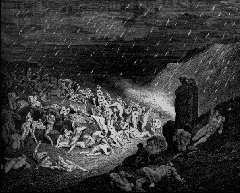 If
the derivation of the word is correct, the ugly face
of organized "religion" in the Hinnom infanticides
reminds us of our own world's "Evil with Lawful Tendencies."
Bad cults, gangs, crime-syndicates, petty dictators,
and robber-barons
are examples of the loosely-organized evil that is symbolized
here. In our era as in Seneca's time, most pretend to virtue
-- "promoting excellence and discipline",
"building character", "promoting
security", and "striving for what is best."
They are enormously vain, though not so well-organized as their
neighbors in Baator. Expect to find much ostentation
and display of wealth and status.
If
the derivation of the word is correct, the ugly face
of organized "religion" in the Hinnom infanticides
reminds us of our own world's "Evil with Lawful Tendencies."
Bad cults, gangs, crime-syndicates, petty dictators,
and robber-barons
are examples of the loosely-organized evil that is symbolized
here. In our era as in Seneca's time, most pretend to virtue
-- "promoting excellence and discipline",
"building character", "promoting
security", and "striving for what is best."
They are enormously vain, though not so well-organized as their
neighbors in Baator. Expect to find much ostentation
and display of wealth and status.
-1 on all charimsa checks for all chaotic creatures
-1 on all intelligence, wisdom, and charisma checks for all non-good, non-evil creatures
-2 on all intelligence, wisdom, and charisma checks for all good creatures
Good-based spells simply fail.
Evil-based spells work as if caster were 4 levels higher.
Law-based spells (non-good) work as if caster were 2 levels higher.
Chaos-based spells (non-good) require a Spellcraft check (DC 15) for success.
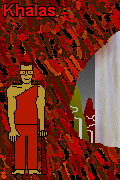
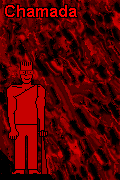
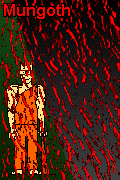
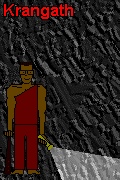
Shakespeare's Macbeth -- down the
slippery slope to evil
The
Plane of Hell --
full of abusive egomaniacs. "With a feeling of sick familiarity,
I recognized here my own thinking."
Don Brubaker --
"You'll first experience hell", God said evenly, with a tone
of complete control, "to prove to you the reality of evil.
You've only believed that there was goodness.
You must see for yourself that hell is real."
Near Death
Experiences -- including accounts of hell.
Hell's Dominion -- a near-death experience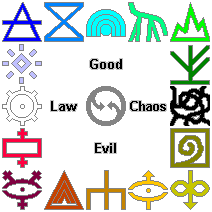
Acheron -- Lawful, Evil Tendencies
Arborea -- Chaotic Good
Arcadia -- Lawful, Good Tendencies
Baator -- Lawful Evil
The Beastlands -- Good, Chaotic Tendencies
Bytopia -- Good, Lawful Tendencies
Carceri -- Evil, Chaotic Tendencies
Elysium -- Neutral Good
Gehenna -- Evil, Lawful Tendencies
The Gray Waste -- Neutral Evil
Limbo -- Chaotic Neutral
Mechanus -- Lawful Neutral
Mount Celestia -- Lawful Good
The Outlands -- True Neutral
Pandemonium -- Chaotic, Evil Tendencies
Ysgard -- Chaotic, Good Tendencies
The Inner Planes
What "Planescape" could be
AD&D and the Religious Right
Li Po's Hermitage (character generators, more)
Ed's character generators:

Less law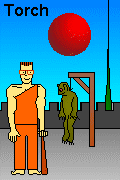
Less extreme
More law
Fourth Edition
Third edition: DD3.5, d20 Modern, Dragonlance, Eberron, Forgotten Realms, lots more.
AD&D2 Generic Character Generator for MS-DOS.
AD&D2 for very limited machines for MS-DOS.
Alternity Science Fiction Character Generator for MS-DOS.
Birthright Character Generator for MS-DOS.
Dark Sun 2 Character Generator and
documentation for MS-DOS.
Jakandor Character Generator
Lankhmar Character Generator
Planescape Character Generator for MS-DOS.
Psionics Character Generator for MS-DOS.
Red Death Character Generator for MS-DOS.
Skills & Powers Character Generator for MS-DOS.
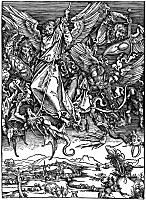
![[Do Justice, Love Mercy, Walk Humbly]](holywar.gif)


